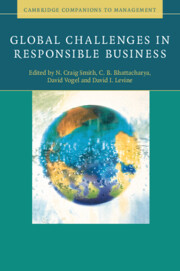Book contents
- Frontmatter
- Contents
- List of figures
- List of tables
- List of contributors
- Foreword
- Introduction: Corporate responsibility and global business
- Part I Embedding corporate responsibility
- 1 A corporate social responsibility–corporate financial performance behavioural model for employees
- 2 The integrative benefits of social alliances: balancing, building and bridging
- 3 Integrating corporate citizenship: leading from the middle
- 4 CSR in search of a management model: a case of marginalization of a CSR initiative
- Part II Marketing and corporate responsibility
- Part III Corporate responsibility and developing countries
- Index
- References
4 - CSR in search of a management model: a case of marginalization of a CSR initiative
Published online by Cambridge University Press: 05 June 2012
- Frontmatter
- Contents
- List of figures
- List of tables
- List of contributors
- Foreword
- Introduction: Corporate responsibility and global business
- Part I Embedding corporate responsibility
- 1 A corporate social responsibility–corporate financial performance behavioural model for employees
- 2 The integrative benefits of social alliances: balancing, building and bridging
- 3 Integrating corporate citizenship: leading from the middle
- 4 CSR in search of a management model: a case of marginalization of a CSR initiative
- Part II Marketing and corporate responsibility
- Part III Corporate responsibility and developing countries
- Index
- References
Summary
Introduction
A key trend of recent years is the emergence of CSR as a managerial field. As noted by The Economist, ‘Corporate Social Responsibility is now an industry of its own right, and a flourishing profession as well.’ This field involves the creation of a set of markets devoted to the communication, measurement and evaluation of CSR and Corporate Social Performance (CSP). It is also marked by the multiplication of sectoral codes of conduct and other global standards. It has also been accompanied by the emergence of new kinds of actors and CSR experts outside (CSR consultants and auditors) and within companies (sustainability or CSR departments have been created within most public companies) and the multiplication of educational programmes dealing with CSR management.
To some extent, this situation echoes the ‘Corporate Social Responsiveness’ era of the late 1960s and 1970s. In a turbulent societal context, various companies had developed issues management departments to handle pressing social controversies, such as equal rights for minorities, consumer rights or environmental concerns. Researchers who studied those dynamics based their approach on the idea that CSR was not only a question of ethics, but that it also involved specific and difficult managerial problems. In itself, managers' will to increase the social good was not enough to implement efficient and sustainable CSR programmes. Rather, a key question was to understand how to select the most pressing issues, take relevant decisions, develop the appropriate management frameworks, tools and implementation approaches to respond to social pressures.
- Type
- Chapter
- Information
- Global Challenges in Responsible Business , pp. 107 - 132Publisher: Cambridge University PressPrint publication year: 2010
References
- 5
- Cited by



